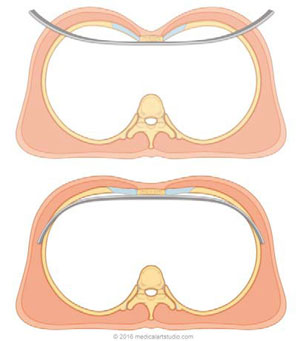Nuss Procedure
 Nuss procedure is a type of minimally-invasive procedure (small incisions
of 2–3 inches long / general anesthesia) performed to correct severe
pectus excavatum. Pectus excavatum is a condition in which the breastbone (sternum) of
the chest is caved in. This happens because several ribs and the breastbone
grow abnormally. Most patients with pectus excavatum do not have symptoms.
But for some with severe cases,
chest pain or shortness of breath may occur. Others may want to have the pectus treated
for aesthetic reasons.
Nuss procedure is a type of minimally-invasive procedure (small incisions
of 2–3 inches long / general anesthesia) performed to correct severe
pectus excavatum. Pectus excavatum is a condition in which the breastbone (sternum) of
the chest is caved in. This happens because several ribs and the breastbone
grow abnormally. Most patients with pectus excavatum do not have symptoms.
But for some with severe cases,
chest pain or shortness of breath may occur. Others may want to have the pectus treated
for aesthetic reasons.
How to Prepare for Nuss Procedure
Prior to the procedure, your doctor and treatment team will explain to you what to expect before, during and after the procedure and potential risks of the procedure. Talk to your doctor about:
- All medications, herbal products and dietary supplements you are currently taking and ask for their recommendations about each.
- Radiation exposure, especially for those that are pregnant.
- Any allergies to medicines, latex, tape, iodine, and anesthetic agents.
- Any history of bleeding disorders.
- Any body piercings on your chest or abdomen.
Other recommendations include:
- Eat a normal meal the evening before the procedure. However, do not eat, drink or chew anything after midnight before your procedure. If you must take medications, only take them with sips of water.
- Leave all jewelry at home.
- Remove all makeup and nail polish.
- Wear comfortable clothing when you come to the hospital.
- If you normally wear dentures, glasses, or hearing devices at home, plan to wear them during the procedure.
What to Expect Before Nuss Procedure
To determine whether you need this procedure, your doctor might perform a variety of diagnostic tests, including:
What to Expect During Nuss Procedure
Nuss procedure will typically take between 2 to 3 hours to complete. This procedure is typically performed in the cardiothoracic operating room (OR). Check with your doctor about the details of your procedure. In general:
- You will change into a hospital gown.
- A nurse will start the intravenous (IV) line in your arm which will administer medications and fluids during the procedure.
- Usually, your doctor will administer general anesthesia (make you feel sleepy).
- Once you are sedated, your doctor may insert a breathing tube through your throat into your lungs and connect you to a ventilator. This will breathe for you during surgery.
- The doctor makes two small incisions in the side of the chest and inserts a camera for guidance.
- Through these incisions, your doctor will place one or more steel bars behind the breastbone and attach them to the outer edge of the ribs.
- Individually curved for each patient, the steel bar is used to correct the depression and is secured to the chest wall on each side.
- The bar is left in place for 3 years and later removed.
- A metal plate (called a stabilizer), sutures (stitches), or wire is placed to hold the bars in place.
- The doctor will close up the incision(s) with stitches or staples, and you will be moved to the recovery area.
What to Expect After Nuss Procedure
After the surgery, you will be taken to the stepdown unit for 5 to 7 days. Other recommendations include:
General Guidelines
- The breathing tube is removed when you wake up from anesthesia.
- Ambulation is started on the first or second day of surgery.
- Urine catheters and drainage tubes (chest tubes) are removed after 24 to 72 hours.
- You can probably do your normal activities after the surgery. But, you may need to take it easy at first. No heavy lifting or vigorous exercises until your body has healed.
- Receive several different medicines to relieve pain. Patients will be given long-acting oral pain medication, NSAIDS, IV pain medication and multi-level intercostal nerve blocks.
- Have X-rays taken to ensure that the bar is in place and that the lungs are fully functional.
- Sit up in bed once he/she feels strong enough to do so.
- Your doctor will give you instructions to follow during your recovery.
